Below is a list of Society awards presented during the Hawai’i meeting:
2024 Clay Minerals Society (CMS) student presentation awards
A total of thirty student presentations (7 posters and 23 oral presentations) were evaluated by seventeen judges who attended the conference. Posters and oral presentations were evaluated separately.
Student presentations were rated: 0-24: very poor; 25-39: poor; 40-54: Fair; 55-69: Good; 70-84; and very good: 85-100 for each of of the following five criteria. The average and median scores (out of a total maximum of 500) were 411 and 413, respectively. This indicates that all students gave great presentations at the conference.
- Content (Structure and relevance)
- Clarity (Structure and organization)
- Quality of slides/poster
- Quality of conclusions
- Stage presence, voice quality, and pace
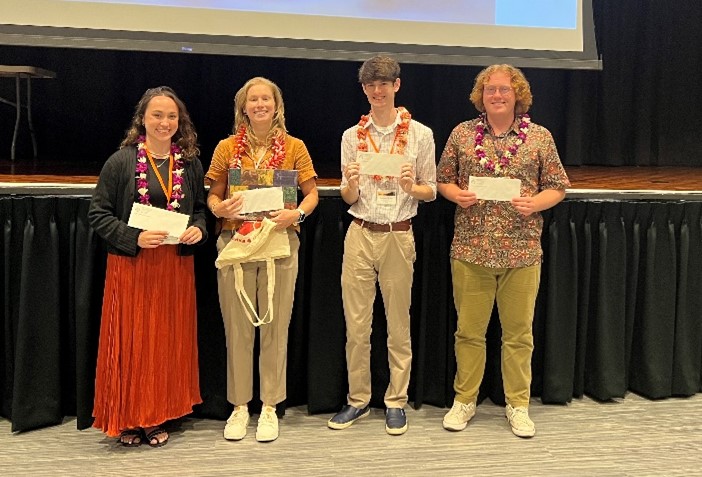
Oral presentation awards (From left: Maria L. Arizaleta (University of Alberta, Canada), Natalie Jones (Northern Arizona University, USA), Jackson C. Stewart (University of Louisville, USA), and Aaron Chipman (Brigham Young University, USA).
Poster presentation award: Willam Lawrence (The California Institute of Technology, USA, not present in the picture)
2024 Clay Science Society of Japan (CSSJ) Young Researcher’s Award
Yuto Nishiki (National Institute of Advanced Industrial Science and Technology, Japan)
Kanji Saito (Akita University, Japan)
Hanaya Okuda (Japan Agency for Marine-Earth Science and Technology, Japan)
Zachary Burton (Bates College, USA)
Tae-hee Koo (Yonsei University, Korea)
Zhao Lulu (China University of Geosciences, China)
2024 Korean Clay Science Society student presentation Award
Three awards were presented.
The Clay Minerals Society Awards
The Marilyn and Sturges W. Bailey Award
Dr. Jan Srodon (Institute of Geological Sciences PAN, Poland) receives this highest honor of the Clay Minerals Society (CMS). It is awarded solely for scientific eminence in clay mineralogy (in its broadest sense) as evidenced primarily by the publication of outstanding original scientific research and by the impact of this research on the clay sciences.
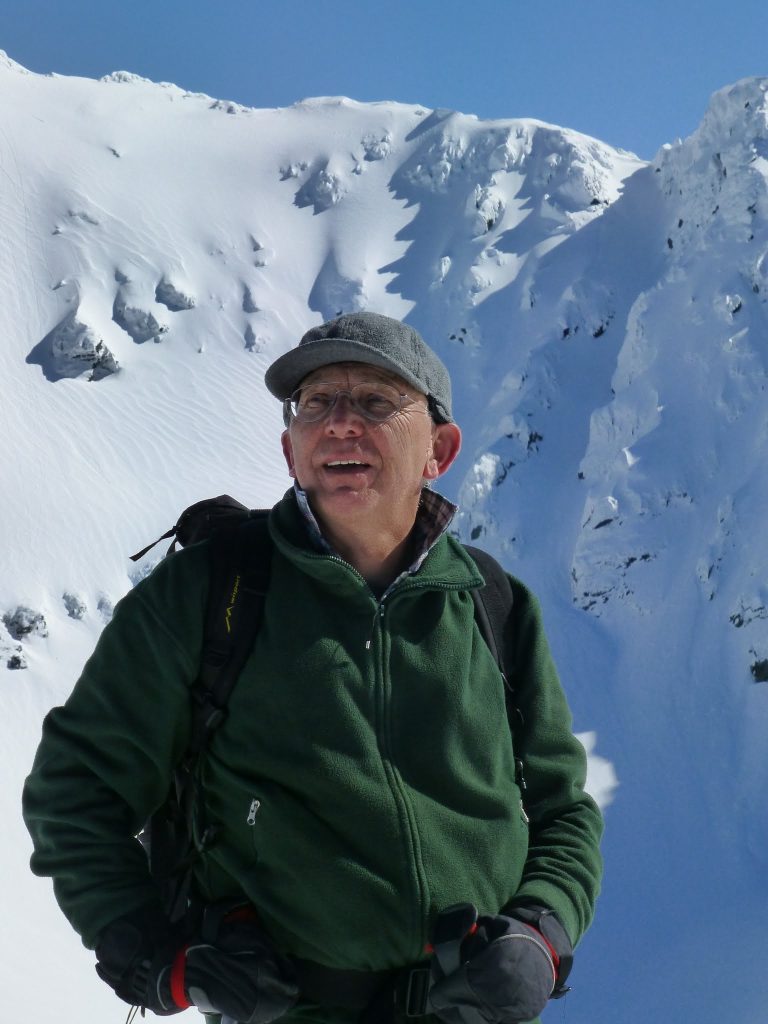
Jan did his Ph.D. in geology in 1975, on the mineralogy of zoned Carboniferous bentonites, at the Academy of Mining and Metallurgy in Krakow. Since 1972, he has worked at the Institute of Geological Sciences PAN in that city. He did a Fulbright postdoc 1975-76 with John Hower in Cleveland, Ohio, and later, he spent five years in the US at USGS, Texaco, and Chevron, and two years in France at CNRS. His dominant research interests involve illite-smectite: methods of studying this mineral group, its mineral composition, its role in the global cycling of elements, and its use in studying geological processes, in particular thermal histories of sedimentary basins.
The G. W. Brindley Clay Science Lecture Award
Dr. Prakash B Malla (Thiele Kaolin Co., USA) receives the G. W. Brindley Clay Science Lecture Award. He is recognized as a clay scientist who will infuse the Society with new ideas, someone who is both a dynamic speaker and involved in innovative research.
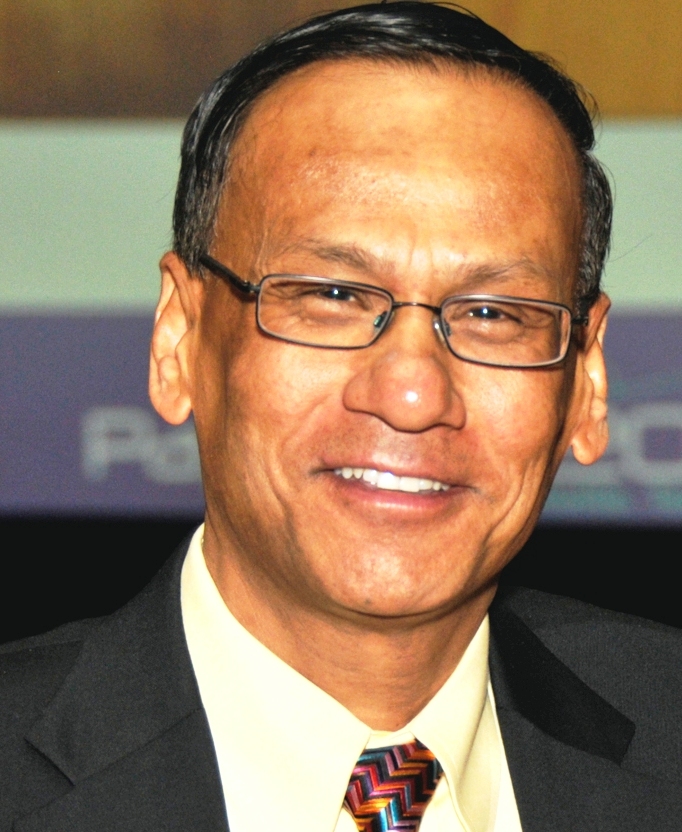
Dr. Malla is the director of Research & Development at Thiele Kaolin Company where he is involved in fundamental and applied research on kaolin and silica. He holds a Ph.D. degree in Clay Mineralogy and Clay Chemistry from Rutgers University (1987) where he studied the layer charge properties of expandable 2:1 clay minerals. He also spent 5 years working in the area of material science and engineering at Pennsylvania State University where he developed special classes of nanoporous materials from pillared clays, silica gels, and zeolites for dehumidification applications. He is the inventor or co-inventor of 16 U.S. patents. Dr. Malla will discuss his professional journey, “Transition from Expandable to Non-expandable Clays via Nanoporous Materials.”
Marion L. and Chrystie M. Jackson Mid-Career Clay Scientist Award
Dr. Eric Ferrage (Universite de Poitiers, France) received the M. L. and Chrystie M. Jackson Award. The award was to recognize a clay scientist for excellence in the contribution of new knowledge to clay minerals science through original and scholarly research.
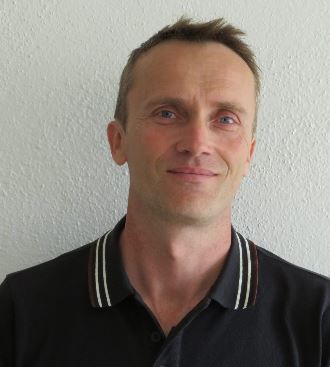
Eric Ferrage obtained his PhD from the University of Grenoble (France) in 2004, followed by two postdoctoral positions at the Natural History Museum of London and the University of Nancy. He joined the CNRS in 2007 as a permanent researcher at the Institute of Chemistry and Material Resources (Poitiers, France). Since then, his work has focused on the multiscale analysis of the structural and dynamical properties of fluids in contact with natural phyllosilicates, using experiments (mainly X-ray diffraction) and simulations (molecular and Brownian dynamics) to understand the fate of water and solutes in the environment.
The CMS Pioneer in Clay Science Lecture Award
Dr. Toshihiro Kogure (Tokyo University, Japan) receives the Pioneer in Clay Science Lecture Award. This award is given to a clay scientist whose research has led to important new directions in clay minerals science and technology.
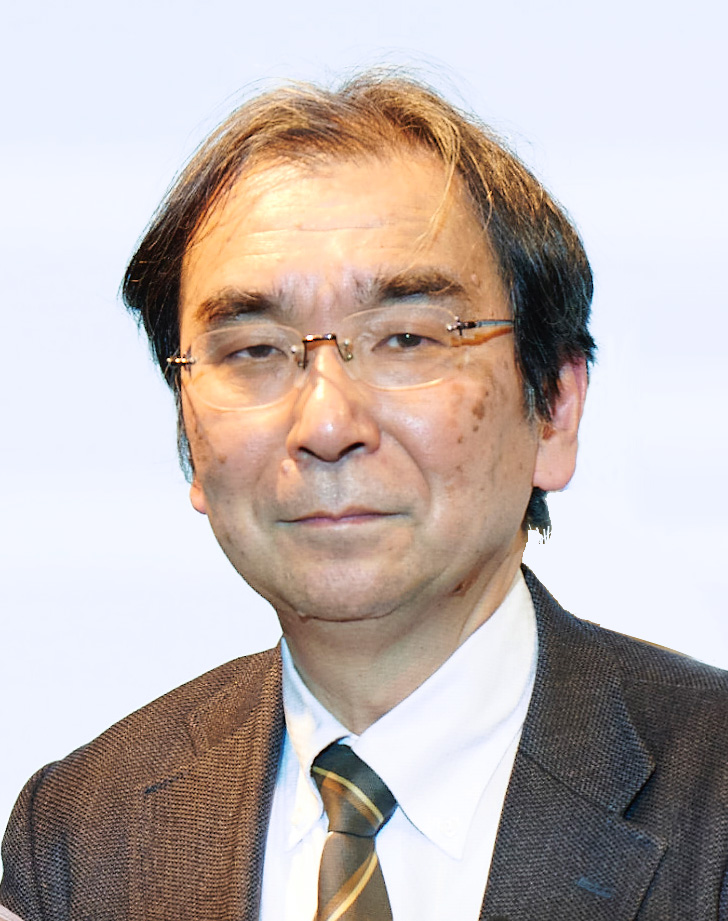
Dr. Kogure received his Ph.D. in mineralogy from the University of Tokyo, worked as a researcher at a private company, and then engaged in research and education as a professor at the University of Tokyo until 2023. He has produced many results in the analysis of the microstructure of clay minerals or phyllosilicates, mainly using TEM, and elucidation of their formation mechanisms. He is particularly well-known for his research in clarifying the structure of beam-sensitive clay minerals using HRTEM. In addition, he conducted research on biominerals and radiocesium contamination by Fukushima nuclear accidents. He has published over 230 original papers.
The Clay Science Society of Japan (CSSJ) award
The Clay Science Society of Japan (CSSJ) young researcher’s award
This award recognizes young researchers who have made excellent presentations, regardless of their nationality. There is no cash prize for this Award. CSSJ is now accepting applications for this award.
Deadline: May 1st, 2024
Eligibility: This award is open to researchers up to the age of 34. Non-CSSJ members are also welcome to apply. How to apply: Applicants should register at the CSSJ website and select this award to be considered.
